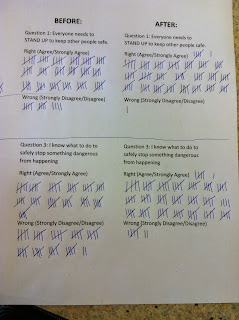So today was the first day of Senior Projects. For me, this meant putting an end to my unhealthy obsession with The Mindy Project and getting up out of my comfy queen-sized bed that includes not one, but two large comforters. This is the first time in days that I had to put on makeup and the first time in months that I wore my nice (yet uncomfortable) black slacks and blazer.
The beginning: this morning I had a slight panic attack. It was the first time I actually realized that I would need to drive myself downtown, find a parking lot that wasn't too far away, and find which shiny building would be the one hiding the Cleveland Rape Crisis Center. Well needless to say, I already had a headache after taking the crazy roads and parking on the 8th floor of a parking garage that just kept circling upwards. Although I made it into the office which happened to be on the 14th floor. I met Alexander Leslie right away, the man who I will be shadowing for the next few weeks. I also met Joe Hendrickson, future football player for the University of Tennessee (who also "volunteered" today).
Our work began right as I entered the buzzed-in doorway. I started by interpreting data from a session of Alex's. He had previously went into a school, given a session on what it means to be a "bystander", and had the students take an agree/disagree survey before and after his session. I was the one who viewed the hundreds of responses and simplified them into tallies.
Here is some of my work:
After I did this, I sat in on one of his seminars called "Catalyst". The point of the presentation is to be an active bystander, and to "speed up" positive change (hence the name Catalyst). The important things I learned were why people do not help others and how you can affect others without changing yourself.
Reasons why it is difficult to be an active bystander:
1) people act differently in crowds. In crowds of people, each "good" person assumes that there will be someone else, usually someone more qualified, to help a person in need. For example, if a girl was choking at a restaurant, the average person would assume there's a doctor there to help instead of themselves.
2) people fear embarrassment. For example, if you hear people screaming in a room next to you, would you assume it is domestic violence and call the police? Or could you justify the sounds by telling yourself that they are watching a scary movie? You never know. Which is why it is always safe to alert others in case your gut tells you something is not right.
3) peer pressure. If the people around you say something is not a big deal, you are most likely not to act either.
All of the examples above have studies that prove them. One is below.
When given this picture and the question "which line is similar in length to x", the obvious answer is B. Although when staged actors all say "C" before the subject answers, 88% of subjects would respond "C".
The last thing I learned to actual become an active bystander, is called the three D's.
1)Direct
2)distract
3) Delegate.
With these three tasks, you can help someone else out of sticky situations by talking to the perpetrator directly, distracting the perpetrator before assault(or other acts) occur, or delegate (tell someone else around you who will do something).
Overall,
I am extremely excited to work with Mr. Leslie and the other wonderful people who change lives here. It is a beautiful place and I already feel more knowledgeable. I cannot wait to see what is in store for tomorrow.
As a last message for all of us bystanders when we see something "not right" happening:



No comments:
Post a Comment